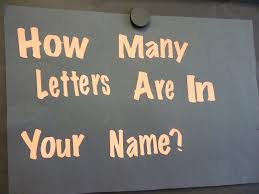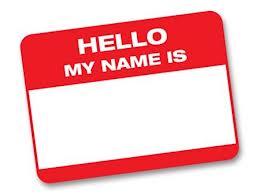When #%^$* computers mess up names

This image from a blog post about the length of children’s names.
Here’s an item out of Hawaii that is making the rounds all over the place, about a woman whose name was just too long for her driver’s license.
As first reported by Honolulu station KHON TV, the state of Hawaii is looking into changing its policy for how many letters can be on a driver’s license after Janice “Lokelani” Keihanaikukauakahihuliheekahaunaele complained that her name was truncated on her state driver’s license. (She used to solve the problem by carrying a second piece of ID that filled in the gap. But that ID expired and she was no longer able to finesses the problem.)
Her story is running across the U.S., in Canada, and in the U.K. (Yes, yes. I know I should be embarrassed to read the Daily Mail, with its low-brow tabloid tendencies. But they actually do a better-than-average job of rounding up photos to supplement stories. As they’ve done again in this case: more photos, better presentation.)
While the name “Keihanaikukauakahihuliheekahaunaele” may strike some as excessive – a joke – who are we to judge, really? Names are names. They mean a lot to the bearer. And they vary as per time-honored custom, local language and personal preference. Assuredly, there are plenty of people whose letter count is longer than “the system” accommodates.
And it’s not that hard to hit similar bureaucratic walls. People with short, regular names have no idea what those who don’t fit the mold go through.
This AP story from 2008 explains some of the most common ways non-standard names run into trouble:
One: Online forms typically have a filter that looks for unfamiliar terms that might be put in by mistake or as a joke. A bad computer system will not be able to handle an apostrophe, a hyphen or a gap in a last name and will block it immediately.
Two: Even if the computer system is sophisticated enough to welcome an O’Brien or Al-Kurd, the name must be stored in the database, where a hyphen or apostrophe is often mistaken for a piece of computer code, corrupting the system.
That’s what happened during the Michigan caucus in 2004, when thousands of O’Connors, Al-Husseins, Van Kemps and others who went to the polls didn’t have their votes counted.
While it may be more accurate to blame bad programming than computerization, this is a real problem. Heightened security seems to demand exact matches for IDs and reservations, even as disparate systems fail to permit that.
 It’s probably just as nutty for people who change their names by way of marriage or divorce who have to try to prove exact identity by building up official documents that can do so.
It’s probably just as nutty for people who change their names by way of marriage or divorce who have to try to prove exact identity by building up official documents that can do so.
I’m lucky. I’m only saddled with three short names, all spelled in a usual manner. But I hit a similar problem all the time when filling out forms on line. I still travel and do many things in the U.S. Most U.S. businesses or government agencies assume the reader/patron/user has a standard U.S. address, including a zip code. A majority of such sites choke on a postal code. It can be a total show-stopper.
Again, that is something that could be solved with simple programing. So why is that hard?
I’m sure readers have their own observations or tales of frustration on this topic. It’s one area where computerization has not done us a great favor.
Tags: computers, Janice “Lokelani” Keihanaikukauakahihuliheekahaunaele, names, security, standardization








Why do I not care?
Maybe because “Pete Klein” doesn’t run into many computer file issues?
Sometimes it’s all a question of whose ox is being gored.
Other times it’s because the subject holds no interest to the reader, a possibility that is difficult to avoid in each and every outing.
Lucy,
I would always spell your name correctly.